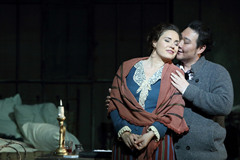| Opera Reviews | 4 July 2024 |
An evening filled with surprisesby Craig A.P. Hamilton |
|
| Puccini: La bohème Munich Opera Festival 3 July 2016 |
|
|
But no, Otto Schenk delivered a traditional 1800s set, Paris étudiantes garrett scene and all, stunning Parisian sunsets, drizzling snow with that slight wintery fogged look that almost had one shivering in one's seat. His direction was carried out with just the right amount of vivaciousness, enthusiasm and levity that relieved the intense emotional build up within each and every one of us. A telling moment was in the final act with a fish that had just been caught and therefore in the throes of dying and was being passed from one to another of the struggling students with much ease and hilarity. Asher Fisch, who had dissappointed in his orchestral assigments with the West Australian Symphony Orchestra, showed from the beginning that he had greater control of the opera orchestra. He was able to bring out the over the top emotional dopamine hit that is an absolute requirement here. The instruments were strung out when needed, piercing at other times, and lyrical, dramatic, passionate and intense, delicate and light when required. If one was to really think hard to find something to critique the only thing I could find fault with was in the opening of Act 2 where the ensemble work of the chorus was a trifle messy to begin with, but having said that I put this down to a thrilling, very full stage of public strollers, sellers and buyers of wares, cafe goers and soldiers including its own army band - there was not a bit of stage that was not in use. So line of sight to the conductor could have been problematic. Of particular note though I must mention the children's chorus which were not only highly accurate but a delight to hear and watch. Now to the nitty gritty - the voices. Delightfully this was a particularly strong cast. Korean tenor Wookyung Kim, who made a valiant effort as Don Carlo last year, was cast here as Rodolfo, a role which is well suited for his voice. His sound was full, rounded and coloured in all registers and of particular mention the cracking of his voice when he hugs Mimi in desperation after she aspires was perfection - pure theatre. His Mimi was Sonya Yoncheva who has a powerful soprano voice that could easily fill a larger opera house and I was initially concerned that she would overpower the men and lack colour and nuance. I have never been more pleased to have been proved utterly wrong. Her duet "Dondo lieta usci" with Rodolfo in Act 3 was some of the truly finest singing I have ever heard, with the spell only broken by Marcello's antics at trying to throw a dustbin and its litter after the diva Musetta. Musetta, played by Julie Fuchs, was stupendous in every way. Not only in her "Quando m'en vo'" but in her portrayal as the young flighty female with her sugar daddy, but her eye on another man. Poor Marcello (Levente Molnár) even had to be tied down to his chair by his comrades in order to not yield to temptation but from the word go, he did not stand a chance against her wiles. Her artistry is one for the notebooks. The other supporting roles - Goran Jurić as Colline, Andrea Borghini as Schaunard, and Christian Rieger as the flagrantly faithless landlord Benoît - all sang and acted in a natural and effortless way that resulted in an opera that simply flowed as water would downstream. This was the first production of La bohème that brought home what the idea of death must truly be like to a bunch of twenty somethings whose answer to the existential question regarding the meaning and purpose of life is to "have fun" and here they are at this vulnerable age - psychologically speaking - faced with the very cruel truth of illness and mortality at an early age. Each individual's response was specific, natural, perfectly understandable and relatable. Even the hardest of hearts would not survive this production.
|
|
| Text ©
Craig A.P. Hamilton Photo ©Wilfried Hösl |

 La bohème remains the staple of many opera houses with directors and designers trying to offer different or newer perspectives of the work. Equally, Munich is renowned for its avant-garde productions and I was not holding out much hope for this production having just seen the atrocity of Richard Jones' Lohengrin the night before, which tested the brain to the point of overload.
La bohème remains the staple of many opera houses with directors and designers trying to offer different or newer perspectives of the work. Equally, Munich is renowned for its avant-garde productions and I was not holding out much hope for this production having just seen the atrocity of Richard Jones' Lohengrin the night before, which tested the brain to the point of overload. 





